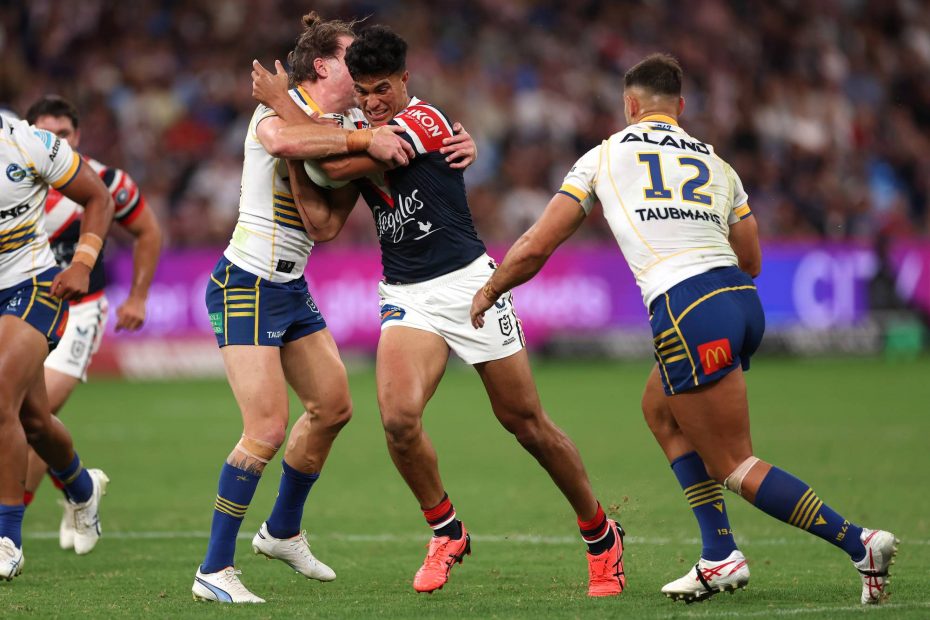If Mark Nawaqanitawase’s shock defection to the NRL wasn’t a big enough warning for Rugby Australia, the governing body has been given another couple of slaps in the face to get a grip or risk a mass exodus on the eve of the most important four years in the history of Australian rugby.
On Wednesday, it was revealed that Wallaby-in-waiting Max Jorgensen, the best young talent in Australia in years, was being hotly pursued by the Sydney Roosters.
Days earlier, Jordan Petaia, whose future in the game is becoming shakier by the day after weeks of murmurs of a code switch, was linked to the Dragons with a meeting to come with new coach Shane Flanagan.
But it’s not just the Wallabies outside backs that are being distracted – dozens of players from Taniela Tupou to Ned Hanigan, Noah Lolesio to Jock Campbell are considering their futures in Australian rugby.
Already Izaia Perese, the tackle-busting centre who has had precious few opportunities at Test level but made an impact with every game, is as good as gone from the Waratahs next year.
The 26-year-old, who had a rousing performance in his sole World Cup match last year against Portugal, is expected to head to the English Premiership where Leicester and Harlequins are hotly pursuing the centre.
At the heart of RA’s issues is a lack of assertiveness being shown by the governing body, the dark cloud hanging over the Melbourne Rebels’ future beyond 2024 and Joseph Suaalii’s pending arrival.
(Photo by Mark Kolbe/Getty Images)
The lack of assertiveness comes as RA’s two fresh additions – director of high performance Peter Horne and Wallabies coach Joe Schmidt – try to play catch-up to discover who’s who in the zoo.
Horne has made a strong early impression with his stakeholders, but the former World Rugby general manager is more of an administrator than a strong, credible contracting figure in the vein of Queensland’s Sam Cordingley or Harlequins’ Billy Millard.
Schmidt, whose appointment has been widely celebrated, has also asked for time so he can make an informed decision regarding players of national interest.
It’s believed he wants to hold fire until the end of March before casting his opinion on players off-contract at season’s end.
That’s a mature line of thinking, one that will appease the wider rugby diaspora, but the market rarely plays ball.
The other elephant in the room is the future of the Rebels.
Few think the Rebels will exist beyond 2025, but until the curtains are brought down on the Super Rugby franchise, should that indeed occur, the other four Australian sides are in a state of limbo regarding their contracting lists.
Already the flesh is being chewed off at the Rebels, with those off contact at season’s end exploring options in Japan and New Zealand especially.
The other factor at play is Joseph Suaalii’s imminent arrival in the game.
While most expect Suaalii to succeed, his mega $1.6 million deal has blown open the expectations of other players and agents.
Where once Israel Folau’s $1m-plus deal ruffled feathers in the Wallabies environment, now his future teammates are thinking how one player is worth two or, in most cases, three times the value they are.
It’s a thorny subject that won’t go away anytime soon, particularly after most of the current crop of players were asked to take pay cuts during the Covid pandemic and are still being told there is no money in the game.
RA has expected next year’s once-in-a-generation British and Irish Lions tour to keep players onshore and while that still holds appeal, the governing body can’t rest on that showpiece event alone, as former Wallaby Matt To’omua noted on The Roar Rugby podcast.
“I don’t think we can take it for granted that [because] we’ve got a Lions series coming up next year and a home World Cup a couple of years’ after that, therefore players are all going to want to stay,” To’omua said.
“Because players ultimately don’t want to stay at – worst case – lose a Lions tour and get embarrassed at a home World Cup, so we can’t take it for granted that guys are going to stay here. We have to build an environment where people want to play and win against the Lions and have a successful campaign.
“Looking at Super Rugby, you’ve seen a lot of the New Zealand teams have a bit more transition because they don’t have a Lions series coming up, they don’t have a home World Cup coming up, so you’ve got your Ardie Saveas, your Richie Mo’ungas going overseas and we’ve probably been cushioned against that because we do have the lure to play that Lions series.
Jordan Petaia, Mark Nawaqanitawase and Andrew Kellaway after going down to Wales at the Rugby World Cup. (Photo by Chris Hyde/Getty Images)
“But we’ve seen with Mark Nawaqanitawase, who’s left, it isn’t as big a carrot as we may have thought and that World Cup experience that they’ve all just had, that plays on peoples’ mind and it’s not necessarily the home run that maybe in the past we might have thought.
“We need to be really clear with the people who we want to retain and the people we need to keep and we need to go after them hard.”
It’s why RA, at the very least, must be out and about meeting players and talking to them.
Communication remains pivotal and currently RA is playing catch up.
It’s a theme that has been occuring for far too long.
